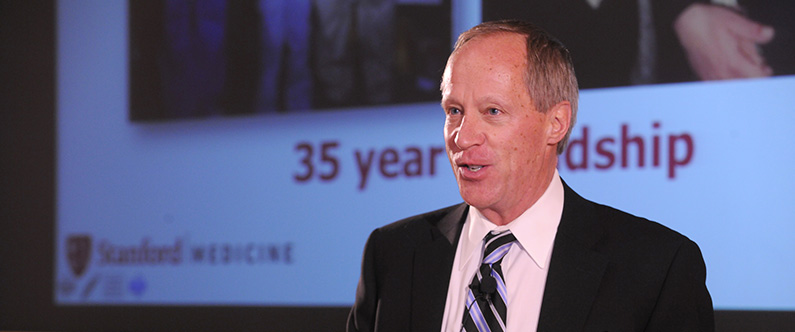WCM-Q Grand Rounds lecture hears of the integration of computing and healthcare
 Dr. Krummel said physicians have unlimited access to acquire almost any information they want simply through their cell phone.
Dr. Krummel said physicians have unlimited access to acquire almost any information they want simply through their cell phone.
The integration of information technology into medicine both today and in the future, was the topic of the latest installment of WCM-Q's Grand Rounds lecture series.
The talk, entitled “Computing and Healthcare”, was delivered by Dr. Thomas Krummel, Emile Holman Professor Susan B. Ford Surgeon-in-Chief at Lucile Packard Children's Hospital at Stanford, and professor, by courtesy, of cardiothoracic surgery and of bioengineering.
Speaking to a lecture hall of physicians, nurses, pharmacists and other healthcare professionals, Dr. Krummel said that progress in medicine and specifically surgery, has resulted from a recurrent cycle of attracting the best candidates, providing an enriching educational environment, but most importantly adapting to change.
Since the 1960s, he said, virtually every aspect of how a surgical operation is performed has changed, and physicians have adapted their skills and knowledge to meet best practice. These changes include the bed that the patient lies in, to the operating room, to the imaging that is utilized, to the pharmacology that the surgeon uses.
He also argued that Mankind’s most profound advancements over the last 75 years have been in the fields of computer science and biomedicine and that over that time the two had converged and were now intersecting each other. This has significant implications for fields like professional development and lifelong learning.
Dr. Krummel said: “For continuing medical education there is unlimited access to acquire almost any information you want, because you essentially have a supercomputer in your pocket in the shape of a cell phone.”
Information technology is also having a huge impact in medical education through virtual reality and simulation, predictive modelling, and visualization. Dr. Krummel predicted that they would all be used for the selection and training of surgeons, but that also, surgeons would eventually be able to practice operations on a patient-specific hologram, before conducting the surgery in the physical world.
Dr. Krummel said: “Ubiquitous computing will revolutionize medical education and patient care as much as has computing has revolutionized everything else in life.”
The Grand Rounds lecture lecture was accredited locally by the Qatar Council for Healthcare Practitioners-Accreditation Department and internationally by the Accreditation Council for Continuing Medical Education.